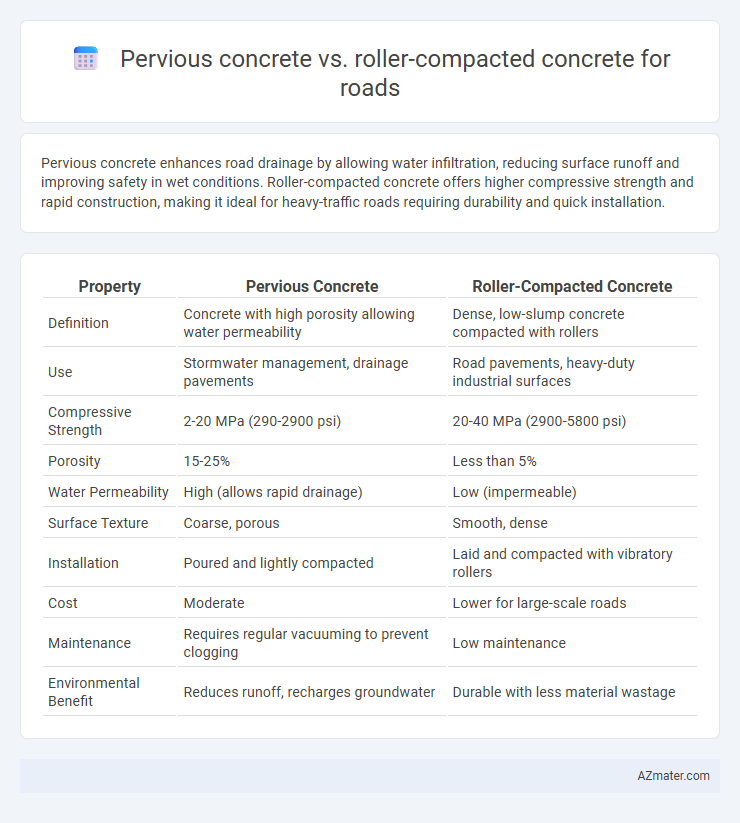Pervious concrete enhances road drainage by allowing water infiltration, reducing surface runoff and improving safety in wet conditions. Roller-compacted concrete offers higher compressive strength and rapid construction, making it ideal for heavy-traffic roads requiring durability and quick installation.
Table of Comparison
| Property | Pervious Concrete | Roller-Compacted Concrete |
|---|---|---|
| Definition | Concrete with high porosity allowing water permeability | Dense, low-slump concrete compacted with rollers |
| Use | Stormwater management, drainage pavements | Road pavements, heavy-duty industrial surfaces |
| Compressive Strength | 2-20 MPa (290-2900 psi) | 20-40 MPa (2900-5800 psi) |
| Porosity | 15-25% | Less than 5% |
| Water Permeability | High (allows rapid drainage) | Low (impermeable) |
| Surface Texture | Coarse, porous | Smooth, dense |
| Installation | Poured and lightly compacted | Laid and compacted with vibratory rollers |
| Cost | Moderate | Lower for large-scale roads |
| Maintenance | Requires regular vacuuming to prevent clogging | Low maintenance |
| Environmental Benefit | Reduces runoff, recharges groundwater | Durable with less material wastage |
Introduction to Pervious Concrete and Roller-compacted Concrete
Pervious concrete features a high porosity that allows water to infiltrate through its surface, making it ideal for sustainable road applications by reducing stormwater runoff and enhancing groundwater recharge. Roller-compacted concrete (RCC), composed of a drier mix compacted with heavy rollers, provides exceptional strength and durability, suited for heavy-traffic roads and industrial pavements. Both materials offer distinct advantages in road construction, with pervious concrete emphasizing environmental benefits and RCC focusing on structural performance.
Key Material Composition and Properties
Pervious concrete features a high-void content with coarse aggregates and minimal fine aggregates, allowing water permeability and reducing runoff, while roller-compacted concrete (RCC) uses a drier mix with a low water-cement ratio and well-graded aggregates for high strength and durability in road construction. Pervious concrete typically exhibits lower compressive strength (3,000-4,000 psi) but excels in stormwater management, whereas RCC achieves compressive strengths exceeding 5,000 psi, providing enhanced load-bearing capacity and faster construction time. Material composition differences directly impact properties such as permeability, strength, and resistance to deformation, influencing their suitability for various pavement applications.
Permeability and Drainage Capabilities
Pervious concrete exhibits superior permeability and drainage capabilities compared to roller-compacted concrete, allowing water to pass through its porous structure and significantly reducing surface runoff and flooding risks on roads. Roller-compacted concrete, while durable and suitable for heavy traffic, has a dense composition that limits water infiltration and requires additional drainage systems to manage stormwater effectively. Choosing pervious concrete enhances road sustainability by promoting natural groundwater recharge and mitigating hydroplaning hazards through improved water dispersion.
Structural Strength and Load-Bearing Performance
Pervious concrete offers excellent drainage and reduces surface runoff but generally exhibits lower structural strength and load-bearing capacity compared to roller-compacted concrete (RCC). Roller-compacted concrete, characterized by its high density and compaction, provides superior compressive strength exceeding 35 MPa, making it ideal for heavy traffic highways and industrial roads. While pervious concrete enhances sustainability and stormwater management, RCC delivers more durable performance under substantial vehicular loads and heavy traffic conditions.
Construction Methods and Equipment Requirements
Pervious concrete requires specialized mixing and placement techniques to ensure its porous structure, typically involving low-speed mixers and pervious-specific vibrators to maintain voids for water permeability. Roller-compacted concrete (RCC) demands heavy-duty construction equipment such as vibratory rollers and pavers designed for high-density compaction without traditional finishing, enabling rapid placement and minimal curing time. The equipment for pervious concrete emphasizes careful handling to preserve permeability, while RCC's machinery focuses on achieving structural rigidity and durability through compaction.
Durability and Maintenance Needs
Pervious concrete, designed for enhanced water permeability, offers moderate durability but requires frequent maintenance to prevent clogging and maintain infiltration capacity over time. Roller-compacted concrete (RCC) provides superior compressive strength and durability, resulting in lower maintenance needs and longer service life under heavy traffic conditions. For roads prioritizing structural integrity and minimal upkeep, RCC is typically preferred, while pervious concrete is chosen for applications emphasizing stormwater management.
Environmental Impact and Sustainability Factors
Pervious concrete enhances urban sustainability by reducing stormwater runoff and promoting groundwater recharge, significantly lowering the risk of flooding and water pollution. Roller-compacted concrete offers durability and resource efficiency through reduced cement usage and rapid construction, minimizing carbon footprint during road projects. Both materials contribute to eco-friendly infrastructure, with pervious concrete prioritizing hydrological benefits while roller-compacted concrete emphasizes structural longevity and reduced material waste.
Application Suitability for Different Road Types
Pervious concrete excels in urban roads and parking lots requiring enhanced stormwater management due to its high permeability, reducing runoff and improving groundwater recharge. Roller-compacted concrete (RCC) is ideal for heavy-duty highways and industrial roads, offering superior strength, durability, and rapid construction with minimal curing time. Roads with high traffic volumes benefit from RCC's load-bearing capacity, whereas pervious concrete suits low-speed, environmentally sensitive areas prioritizing drainage and sustainability.
Cost Comparison and Economic Considerations
Pervious concrete typically incurs higher initial material and installation costs due to its specialized permeable composition and specific curing requirements, whereas roller-compacted concrete (RCC) offers a more cost-effective solution with faster placement and reduced labor expenses for road construction. Economic considerations favor RCC for large-scale projects requiring durability and low maintenance, while pervious concrete provides long-term environmental benefits through improved stormwater management that can offset upfront expenses via reduced infrastructure costs. The choice between these materials depends on project priorities, balancing immediate budget constraints against lifecycle savings and ecological impact.
Conclusion: Choosing the Right Concrete for Road Projects
Pervious concrete offers superior water drainage and environmental benefits, making it ideal for roads requiring enhanced stormwater management. Roller-compacted concrete provides high strength and rapid construction advantages, suited for heavy traffic roads and industrial applications. Selecting the right concrete depends on project priorities such as permeability, load capacity, and construction speed.

Infographic: Pervious concrete vs Roller-compacted concrete for Road
 azmater.com
azmater.com